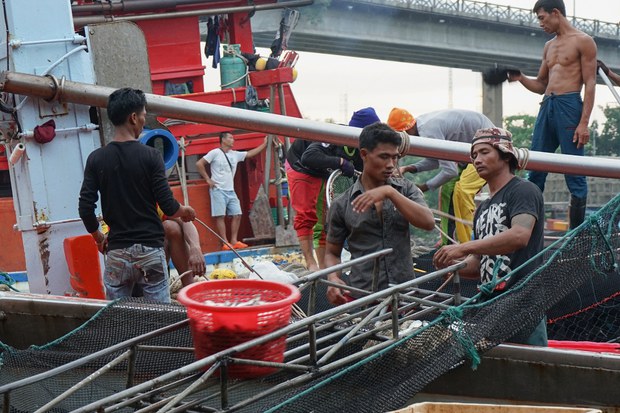EU Lifts Warning on Thai Seafood Industry
2019.01.08
Bangkok
 Foreign migrant workers unload a catch from a fishing boat docked in Pattani, southern Thailand, Nov. 1, 2016.
Foreign migrant workers unload a catch from a fishing boat docked in Pattani, southern Thailand, Nov. 1, 2016.
The European Union on Tuesday cleared Thailand of a potential ban on seafood imports from the Southeast Asian nation, four years after warning Bangkok to tackle illegal, unregulated and unreported (IUU) practices in its multi-billion dollar fisheries industry, officials announced.
Saying it had lifted a so-called “yellow card” given to Thailand, the EU – the world’s biggest importer of fisheries products – acknowledged that the country had “successfully addressed shortcomings” in its seafood industry’s “legal and administrative systems.”
“Today's decision reverses the first step of a process that could have led to a complete import ban of marine fisheries products into the EU,” the European Commission (EC) said in a news release from Brussels. In 2017, Thailand exported 407 million euros (U.S. $465.6 million) in fishery products to the European bloc, according to the EC’s directorate-general for trade.
The European bloc slapped Thailand with the warning in April 2015, after media reports had exposed alleged human trafficking and slave-like conditions for Southeast Asian migrants who worked aboard Thai fishing boats.
Chatchai Sarikulya, a Thai deputy prime minister, was in Brussels on Tuesday when Karmenu Vella, the European commissioner for Environment, Maritime Affairs, and Fisheries announced that the EU had delisted “Thailand from the group of ‘warned countries.’”
“Illegal, unreported and unregulated fishing damages global fish stocks but it also hurts the people living from the sea, especially those already vulnerable to poverty. Fighting illegal fishing is therefore a priority for the EU,” Vella said.
Given Thailand’s central role in the international supply chain for fisheries products, the improvements it had made over the past four years could have a “multiplier effect in the global sustainability” of such natural resources, the EC said.
As it cleaned up its seafood industry to avoid a European ban on its seafood, Thailand introduced a new fisheries law and labor law to reduce the number of unlicensed fishing boats in its fleet from over 40,000 to 10,600 vessels, officials said. Among a host of measures, Thai authorities also compelled fishermen to change fishing gear, such as getting rid of illegal nets that could harm the seabed floor, as well as improving working conditions.
“[We] believe that Thailand has laid foundation to fix the IUU issue in all 6 aspects: law, fisheries management, fleet management, monitoring/control/surveillance, traceability and law enforcement,” Chatchai said in the Thai press release.
In addition, the European Union said it recognized efforts demonstrated by the Thais to “tackle human trafficking and to improve labor conditions in the fishing sector,” although Thailand was not required to do so in implementing measures to be taken off the IUU warning list.
Meanwhile in Bangkok, Thai Prime Minister Prayuth Chan-o-cha hailed the lifting of the yellow card.
“Thanks, EU, for the recognition of the government and kudos to all parties such as fishermen, business owners and government agencies to make it happen,” Prayuth said through his spokesman.
“Commercial fishermen and small-scale fishermen should see the benefits of it. The situation is better. They could sell more products, given the international confidence.”
In coastal southern Pattani province, where many residents rely on fishing for their livelihood, one man said the news elated him.
“I’m glad to hear about the lifting. I feel like I was unchained and hope the government takes it easy on us,” Manasae Salae, a local fisherman, told BenarNews.
Mariyam Ahmad in Pattani, Thailand contributed to this report.







